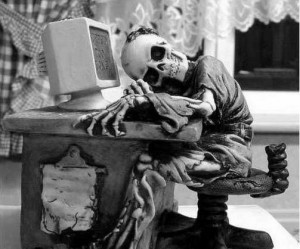 There are a multitude of reasons why novices and even many advanced novices do not make money playing online poker. One little discussed topic is session length. When you play live poker then this usually means a more serious commitment in terms of time taken to travel to the casino or card room. Most poker players will not do this to then only play for half an hour to an hour. However because online poker is so easy to play in terms of the actual physical side of doing it then average session lengths are much shorter.
There are a multitude of reasons why novices and even many advanced novices do not make money playing online poker. One little discussed topic is session length. When you play live poker then this usually means a more serious commitment in terms of time taken to travel to the casino or card room. Most poker players will not do this to then only play for half an hour to an hour. However because online poker is so easy to play in terms of the actual physical side of doing it then average session lengths are much shorter.
You may wonder how that can make a difference to your hourly rate…….well it can make a huge difference. If you play live poker for say one hour then you may only get dealt around 25 hands or. Playing online for one hour then you may see 75 hands or more depending on how many players are at your table. However if you play live then your session length could be six hours or more and there may not be the same maximum buy-in restriction that there is online.
This means that in online no limit hold’em especially, that you often don’t have the time to win these double ups in cash games because your session is too short. This is especially the case if you have a tight style. The bottom line is that you will not experience the compounding of wealth caused by increasing your stack and then playing for stacks and winning bigger pots. For example say that through careful play you increased your stack from 100bb to 150bb over a thirty minute period and then left.
You are happy with your 50bb profit but if you are better than the opposition then you could be missing out on the really big wins. You will rarely see those big 300bb pots when you get all in with the nuts and are called by another stack that covers you. Winning 1.5 buy-ins in one pot is a huge coup and if you played for long enough with 300bb then you may just have a weak fish on your table with another 300bb stack. The fact of the matter is that session length does have an impact on your hourly rate and this is an often little understood facet of online poker.
Carl “The Dean” Sampson is also a poker columnist at www.poker.co.uk
I agree on most points. Just, the thing is, at least in my case, that I often feel myself forced to play to generate enough rake etc.
Balancing life & Poker is very important, I need a break every now and then. If I play too much, too long and too much tables I burn out very fast!
One other point worth mentioning is that online poker allows for multi-tabling. Therefore, number of hands / hour is scaling up to individual skillset / capability. An online player can play a “full day’s” live session within little more than an hour, given X number of tables.
I think Bill brings up some good points about hourly. Meta-game implications can certainly increase your hourly exponentially (example: a regular tilting because you are winning all-ins against him often). In this situation your hourly increases, and it can be increased in deep stacked games like Bill said. Obviously, there are times where hourly decreases from long playtime due to fatigue, but that is very different from player to player.
I differ with your thought that the amount of time spent at the table relates to whether or not you make money online. A solid player is going to make money, regardless the amount of time spent at the virtual felt. He/she will experience the same variance that other players will, albeit in a shorter time. Whether said player gets up after a 50BB win, I submit, has no bearing on a win rate – given all other factors being equal. In other words, yes, a player is leaving “cash on the table” when he is against a less-skilled player who has an equal- or larger-sized stack, once they are deep-stacked. However, there are plenty of short stacked players who will “hit & run” the table, making a decent and algorithmically provable profit, utilizing 50BB starting stacks and quitting the table when they reach 100BB or so.
The issue is not whether the shorter-term player will be profitable, nor whether his/her hourly rate will be different than the longer-term brethren, but the net effect time does to the player’s bankroll. The longer a profitable player plays, the more he/she will add to their bankroll by a function of $/hr * hrs played = profit.